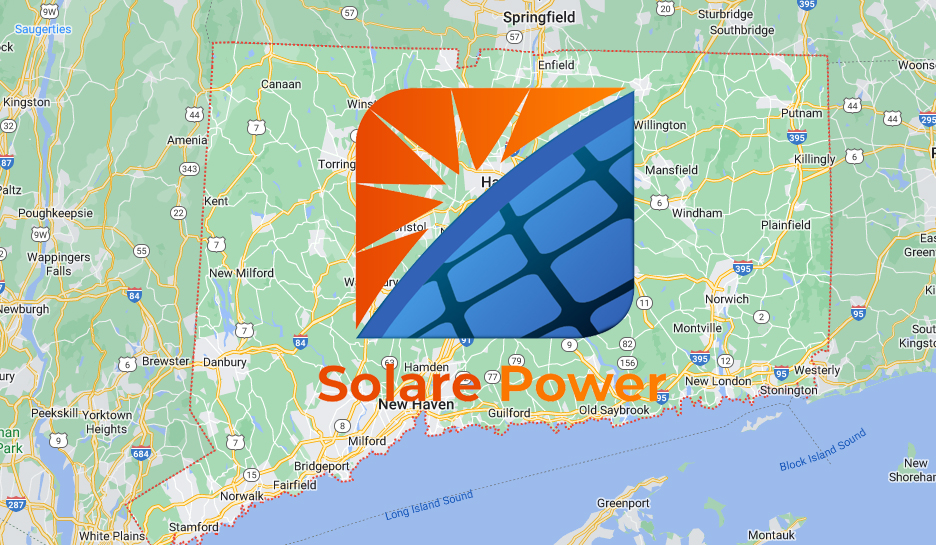Is Solar Worth It In CT?
“A penny saved is a penny earned.” This age-old adage has been around for centuries, and it’s just as true today. Investing in solar energy can be an excellent way to save money and help the environment at the same time.
But is solar worth it in Connecticut? The short answer to are solar panels worth it in CT is YES! In this article, we will explore whether or not investing in solar energy makes sense for Connecticut residents.
Connecticut offers several incentives that make installing solar panels more affordable than ever before. From tax credits to grants from utility companies, there are many ways to reduce the cost of your installation. Homeowners with existing solar systems can benefit from net metering policies, which allow them to sell excess electricity generated back into the grid.
At the same time, there are some drawbacks associated with going solar in Connecticut, including restrictions on which types of solar technologies you can use and how much power you can produce. To find out if these factors impact whether or not solar is worthwhile for CT residents, keep reading!
Benefits Of Solar Energy
Solar energy is an increasingly popular source of renewable energy. With the rapid advancement in technology, it has become a viable option for residential and commercial use. Not only can solar help reduce our carbon footprint by reducing emissions, but also offers several economic benefits that make it worth considering.
One benefit of solar energy is its cost savings potential. Solar systems require little to no maintenance costs as most components are designed to last up to 25 years or more with minimal upkeep required during this time frame. In addition, many utility companies offer rebates and tax incentives when customers install solar panels on their property, further lowering the total cost of installation. This improves households’ bottom line while protecting them from future increases in electricity prices due to inflation or other factors beyond their control.
Another advantage of investing in solar energy is its reliability and efficiency compared to traditional sources like coal or natural gas-powered power plants. Solar power produces clean energy without noise or harmful emissions which makes it an ideal choice for those who want to lead a sustainable lifestyle that preserves the environment for future generations.
Additionally, since sunlight is free and abundant across much of the world, users have access to reliable electricity 24 hours a day regardless of weather conditions – something that cannot be said about other forms of energy sources.
These advantages make solar energy attractive not just from an environmental perspective but also economically – making it worth consideration for anyone looking to lower their monthly utility bills and create long term value for their home or business. From here we turn our attention towards the cost of installing such systems in Connecticut…
Cost Of Solar Systems In CT
Having discussed the benefits of solar energy, it’s time to examine what installing a system in Connecticut might cost. As with any large purchase, there are multiple factors that affect the total expense: such as where you live, how much sun your property receives and whether or not you need additional components like batteries or inverters. Nevertheless, for most residential applications average costs typically range from about $15,000 – $30,000 after all incentives have been applied.

These numbers may seem daunting at first glance but luckily there are several options available to help reduce this number further. For example many utility companies offer net metering programs which credit customers for any excess electricity their systems generate – effectively reducing monthly bills by offsetting usage charges. Additionally, the federal government offers tax credits worth up to 30% of installation expenses making them even more affordable over time.
At the end of the day, investing in solar power can be an attractive option that provides financial savings while helping protect our environment and promoting sustainability both now and into the future. With various incentives available on top of already reduced prices due to advancements in technology and increased competition among providers, going solar is certainly worth considering if you’re looking for ways to save money on utility bills in Connecticut. Up next we’ll look at some of those state-level incentives…
Connecticut Solar Incentives And Tax Credits
In addition to the federal tax credits mentioned earlier, Connecticut also offers a range of incentives and programs designed to help make solar more affordable. For example, homeowners can take advantage of Solar Renewable Energy Certificates (SRECs) which are purchased by utility companies and provide further financial assistance in the form of direct payments.
The state also has its own property tax exemption program that eliminates up to 70% of taxes on installations for qualifying residential customers. This helps offset some of the upfront costs associated with going solar and ensures they remain within budget while still enjoying all the long-term benefits.
Finally, an increasing number of towns across Connecticut have begun adopting municipal energy aggregation plans – effectively allowing residents to bundle their electricity purchases together at lower rates than what’s offered through traditional utility providers. Taken as a whole these various incentives can really add up over time, making renewable energy sources like solar even more attractive from both an environmental and economic standpoint. Understanding your home’s solar potential is key when evaluating whether or not it makes sense for you to invest in this technology.
Understanding Your Home’s Solar Potential
To determine if solar is worth it in Connecticut, understanding your home’s potential is essential. Taking into account the amount of sunshine, roof angle and orientation to the sun can all have an impact on how much power you are able to produce with a solar array. Here are some key points to consider when evaluating your property’s suitability for going solar:
- Know Your Roof – Understand its size, shape and condition as this will help determine which type of system is right for you.
- Consider Orientation – The direction your roof faces determines how much sunlight your panels will receive throughout the day.
- Analyze Sun Exposure – Take note of anything that could cast shade on the area such as trees or tall buildings nearby.
- Evaluate Incentives – Research available incentives like SRECs, tax credits and energy aggregation plans before making any decisions about investing in solar technology.
- Calculate Costs & Savings – Make sure to factor in costs associated with installation and maintenance along with estimated savings over time from using renewable energy sources like solar electricity.
By taking these factors into consideration, homeowners can gain insight into their homes’ ability to generate energy from the sun and make more informed decisions about whether or not they want to move forward with installing a system.
Types Of Solar Panels Available
Now that you understand your home’s solar potential, you’ll need to consider the type of solar panel system best suited for your needs. There are a variety of products on the market with different sizes and levels of efficiency. Consider these essential points when evaluating which system is right for you:
- Solar Cell Types – Monocrystalline or polycrystalline cells offer varying degrees of output and longevity depending on their composition.
- Price Points – Assess the cost-benefit analysis associated with each product to ensure it meets both your current and future energy needs while remaining within budget.
- Installation Process – Familiarize yourself with installation details such as roof mounting brackets, racking systems, wiring requirements, etc., in order to properly prepare for the installation process.
- Maintenance Needs – Make sure to factor in any additional costs related to upkeep after installation so you can remain confident in your system’s performance over time.
By taking all factors into consideration, homeowners can make an educated decision about which type of solar technology is best for them and their property.
Best Solar Installers In Ct
Now that you understand the types of solar panels available, it’s time to explore who can install them for your home. Selecting a reliable installer is key to ensuring your system’s long-term performance and satisfaction. Doing your research on local providers will help you find qualified professionals with experience in installing systems like yours.
Check reviews from past customers, ask about certifications and licenses, and inquire into any warranties or guarantees offered by the company. Additionally, look for companies offering additional services beyond installation such as maintenance agreements or battery storage solutions. Taking these extra steps beforehand can save both money and headaches down the road. Here are some of the the top 3 best solar companies in ct.
By investing some time upfront in researching potential contractors, you’ll be able to make an informed decision when selecting the best solar installer for you. With this foundation laid, let’s take a look at how to finance a new solar system.
Financing Options For A Solar System
The sun casts its rays over the Connecticut landscape, offering an abundant energy source that you can easily tap into. With a few simple steps, you can begin harnessing this power to reduce your monthly electricity bills and become more sustainable. But before taking the plunge, it’s important to understand all of your financing options for installing solar panels.
Fortunately, there are several ways to pay for a system:
* Loans: Many states offer favorable loan repayment terms with long-term fixed interest rates designed specifically for solar systems. This option is ideal if you plan on staying in your home for the duration of the loan term.
* Solar leases/power purchase agreements (PPAs): These types of arrangements allow homeowners to access solar without having to purchase the equipment outright or take out a loan. Instead, they lease their roof space and make payments based on how much electricity is generated from their system.
* Tax credits/rebates: Federal tax credits help offset installation costs by up to 30%, while some states also provide additional incentives like rebates or grants.
These tools give homeowners multiple avenues for accessing clean energy at an affordable rate; however, each has different implications and may not be available depending on where you live. It pays to do your research beforehand so that you know which path makes sense for you.
Pros And Cons Of Going Solar In Ct

Having weighed the various financing options, it’s time to look at the pros and cons of going solar in Connecticut. On one hand, sunny days mean you can generate a lot of electricity from your system. And with no need for fuel or maintenance costs, homeowners will save money in the long run. Furthermore, having solar panels installed adds value to homes – making them more attractive to potential buyers if you decide to move.
On the other hand, there are some drawbacks that come along with installing solar panels as well. Upfront installation costs can be high; although these may be reduced by taking advantage of incentives like tax credits or rebates. Additionally, since Connecticut is known for its cloudy days and seasonal weather fluctuations, energy production may not always meet expectations during certain times of year.
Nevertheless, given all the benefits associated with going solar – including financial savings and environmental protection– many homeowners still find this option appealing even after considering its downsides. With proper research and planning, they can make an informed decision about whether investing in solar power makes sense for their particular situation.
Net Metering Regulations
When it comes to making solar energy worth your while in Connecticut, net metering regulations are essential. In a nutshell, these policies allow homeowners with solar systems to sell their excess electricity back to the grid for credit. This means that not only can you reduce your overall electric bill but you may even be able to make a profit if you generate more than what you consume! Amazingly, this type of arrangement is available all across the state – from Hartford County down through New London County and beyond.
The power generated by net metering is nothing short of incredible. Not only does it provide financial incentives for homeowners who invest in renewable energy sources, but it also helps promote sustainability within local communities. Additionally, participating in net metering allows people to contribute towards reducing air pollution caused by non-renewable fuels like coal or natural gas.
Net metering makes going green an attractive option all around – both financially and environmentally. It’s no wonder why so many people turn to this system when looking at ways they can save money on their electric bills while still doing their part for the planet!
Connecting To The Grid
Once you’ve decided to partake in net metering, the next step is connecting your solar system to the grid. This process can be quite simple but it’s important that you do it properly and with all necessary safety precautions in mind. Before attempting any connections yourself, make sure to contact a qualified electrician who will be able to ensure everything runs smoothly and safely.
The connection itself requires two parts: wiring your house’s main utility panel directly into your solar system and then setting up an inverter so electricity generated by the panels can be used throughout your home or sold back to the power company. You’ll also need to have an electrical meter installed that measures how much energy is being produced and consumed on both sides of the equation. After this setup is complete, you’re ready to start seeing some serious savings!
Connecting your solar system to the grid doesn’t just help reduce your monthly bills; it also allows for greater peace of mind knowing that you are actively doing something about our planet’s current environmental crisis. While there may be some upfront costs associated with this project, its long-term benefits are undeniable – both economically and ecologically speaking. With these advantages in mind, now comes the task of maintaining your system for optimal performance over time.
Maintaining Your System
Going solar is a big commitment, and to make the most of it you’ll need to stay on top of your system’s maintenance. Regularly cleaning off the panels, checking for any faults or damage, and keeping an eye out for potential upgrades can all help ensure optimal performance over time. Additionally, if you live in a place with significant weather extremes like snowfall or high winds, you may want to consider investing in protective covers or other reinforcements to guard against extreme conditions that could affect your system’s output.
It’s also important to keep track of your energy production through monitoring software or online tools offered by your local utility company – this way you’ll know exactly how much electricity is being generated throughout the year so you can adjust accordingly (for instance increasing panel angle during summer months). By staying vigilant about maintenance and monitoring, you will be able to maximize your savings while minimizing overall stress levels associated with managing a major home improvement project.
Ultimately, regular upkeep is key when it comes to getting the most out of your solar investment. If cared for properly and regularly monitored, not only will you benefit from reduced monthly bills but also peace of mind knowing that your system is running efficiently and safely. With these considerations taken into account, we now turn our attention towards battery storage solutions as another option for increased savings.
Battery Storage Solutions
Battery storage solutions are becoming more and more popular for homeowners looking to maximize their solar savings. By storing excess energy during peak production times, you can use it later when electricity prices may be higher or your panels aren’t generating as much output.
For example, Mark Smith of Connecticut installed a battery system in his home after seeing his electric bills skyrocket over the summer months due to air conditioning usage. With the help of this new technology, he was able to store extra power generated by his solar panel system during the day and then draw on that stored energy at night – saving him hundreds of dollars per month while also reducing his carbon footprint.
However, there are some drawbacks to consider before investing in a battery storage solution; most notably cost, which is often very high upfront but should pay off eventually if you’re utilizing your system correctly. Additionally, these types of systems require regular maintenance such as checking fluid levels and ensuring proper ventilation for optimal performance – something that many people might not have time for or feel comfortable doing themselves.
In spite of these potential issues though, battery storage systems offer tremendous value when integrated into an existing solar setup – meaning they could be worth considering depending on your individual circumstances and needs. And with advancements in technology occurring all the time, buying one now will ensure that you benefit from any future innovation too!
How Long Will A System Last?

When it comes to determining how long a solar system will last, the answer depends on a variety of factors. For one thing, quality matters; those who invest in top-of-the-line panels and equipment can expect their setup to remain operational for decades – often with minimal maintenance costs over time. Additionally, location plays an important role too; systems installed in climates where weather conditions are more extreme may need to be replaced sooner than those that experience milder temperatures year round.
It’s also worth mentioning that most warranties cover everything from installation labor to parts repair or replacement should something go wrong. This means that if you purchase your components through a reputable supplier, they’ll likely have some sort of guarantee in place so you don’t get stuck paying out-of-pocket expenses down the line.
All told, investing in solar is generally thought of as being a worthwhile endeavor due its potential savings and environmental benefits. With proper care and attention, these setups can last many years while providing clean energy at little cost – making them an attractive option for anyone looking to reduce their utility bills and carbon footprint alike!
Common Questions About Going Solar In CT
Connecticut is proving to be a leader in renewable energy, with over 15,000 homes having already made the switch to solar power. This number is expected to grow significantly in the near future as more and more people become aware of the financial incentives available for going green. But before making such an important decision, it’s understandable that many residents have questions about what it means to go solar in CT.
One common inquiry involves potential return on investment (ROI). Fortunately, thanks to state-level tax credits and other savings opportunities, homeowners can usually recoup their installation costs within 5-7 years – depending on various factors like system size and electricity usage habits. Additionally, some companies may offer financing options so you don’t have to pay upfront out of pocket either.
Another frequent concern revolves around maintenance requirements. Thankfully, most modern panels require very little upkeep; typically just being kept clean by wiping off dust or debris every now and then is enough. In fact, once installed they should continue producing electricity without any involvement from the homeowner whatsoever!
Overall, there are numerous benefits associated with switching to solar energy in Connecticut – from reducing emissions and protecting natural resources to saving money both immediately and longterm. With all this considered, it’s no wonder why so many are considering investing in solar today!
Other Renewable Energy Sources
While solar is a great renewable energy option for Connecticut residents, it’s not the only one available. Wind power can be harnessed in both onshore and offshore locations to generate electricity with minimal environmental impact. Similarly, hydroelectricity has been around for centuries and is still used today to produce power from flowing water sources like rivers or streams.
Biomass energy – obtained by burning organic materials such as wood chips, agricultural waste, and animal manure – is also an increasingly popular choice in some areas of the state due to its low cost and relatively large potential output. Additionally, geothermal technology captures heat stored beneath the Earth’s surface to create electricity; this method works best in certain regions where temperatures are consistent year-round.
No matter which renewable source you choose, there are plenty of incentives out there that make investing more viable than ever before. With all these options at your fingertips, now might just be the perfect time to start exploring how you can become part of the green revolution!
Frequently Asked Questions
What Is The Average Return On Investment For Solar Energy In Ct?
Investing in solar energy can be an excellent way to reduce electricity bills and increase the value of your home. But how much return on investment (ROI) can you expect from installing solar panels in Connecticut? This article will explore the ROI for investing in solar energy in CT, as well as other factors that may influence a homeowner’s decision.
In general, homeowners who invest in residential solar systems tend to see a 3-7 year payback period before they begin to realize net savings. In addition to this shorter term return, there are also more long-term benefits associated with going solar. Homeowners can expect their property values to increase by approximately 4%, while their electricity bills decrease by around 40%. Solar installation costs have dropped significantly over the past decade, making it even easier for homeowners to recoup the cost of installation quickly.
The state of Connecticut has several incentives available for homeowners who choose to go green and install solar panel systems. The state offers tax credits and rebates which could help cover some or all of the upfront costs associated with a residential system. Additionally, most utility companies offer additional incentives such as net metering programs which allow customers to sell back excess power generated through their system at a premium rate.
When considering whether or not to invest in solar energy, homeowners should factor in all aspects including short-term ROI potential, longer term financial gains and environmental benefits; it is clear that these elements combined make solar energy an attractive option for many Connecticut residents looking to save money and protect the environment.
How Long Does It Take To Install A Solar System?
Installing a solar system is an important decision that homeowners must make. When considering this option, it’s essential to understand how long the installation process will take. The amount of time required depends on several factors such as size of the system and local conditions in Connecticut.
Take for example, John Doe from Hartford who was looking to install a medium-sized photovoltaic (PV) system on his roof two years ago. After consulting with professionals and obtaining all the necessary permits, he opted for a 10 kW PV system and completed the entire process within three months—from paperwork to physically mounting panels onto his roof.
The length of time it takes to set up a solar power system can vary significantly depending on the complexity of the project and other environmental considerations. It’s best to consult with experienced professionals when undertaking these types of projects in order to ensure proper planning and timely completion. By having your expectations realistic about how long it might take, you can be sure that you are making an informed decision before investing in solar energy for your home or business in CT.
Are There Any Government Subsidies Available For Installing A Solar System?

Are there any government subsidies available for installing a solar system? The answer is yes! Solar energy has become increasingly popular in recent years, and as such, many governments have put forth legislation to incentivize people to go solar. In the United States, federal tax credits are available to those who install a residential or commercial solar system.
Furthermore, there are also state-level incentives that can help reduce the overall cost of going solar. For example, some states offer grant programs that cover part of the installation costs, while other states provide property tax exemptions or rebates on electricity bills. These incentives vary from state to state but they all serve the same purpose: To make it easier and more affordable for homeowners and businesses to go green with their energy use.
In addition to these financial incentives, many local municipalities also offer discounts on permits required for installing a solar system. This helps reduce red tape when adding renewable energy sources like solar panels onto your home or business. All of these factors add up quickly and can result in significant savings over time when you choose to invest in clean energy solutions like solar power.
TIP: Don’t forget about the environmental benefits associated with using solar power too! Not only will you be saving money by installing a solar system but you’ll also be doing your part in helping our planet stay healthy and sustainable.
What Are The Potential Safety Risks Associated With Having A Solar System?
When considering the installation of a solar system, safety should always be taken into account. Although it’s true that there are many benefits to having a solar system, such as energy savings and environmental sustainability, potential safety risks must also be considered before investing in one. It is important to understand what these risks may be so you can make an informed decision about whether or not to install a solar system for your home.
One of the primary concerns when installing any type of electrical system is fire risk. Solar panels use electricity generated by sunlight, which means they produce heat during operation – making them potentially dangerous if not properly installed. High temperatures from improperly wired systems could cause fires while poor maintenance could lead to sparking and arcing problems that can damage equipment and buildings alike. Additionally, heavy snowfall on top of roof-mounted systems can create additional pressure leading to structural damage over time.
For these reasons it’s essential to hire a professional who understands local building codes and regulations related to solar panel installations for your area in order to ensure proper installation and reduce any associated risks with owning a solar system.
Furthermore, regular maintenance checks should be conducted throughout the year in order to identify any issues early on that could pose future threats down the road. Taking precautions like this will help protect both you and your property against potential dangers associated with having a solar system installed at home.
Are There Any Special Maintenance Requirements For A Solar System?
When it comes to solar systems, there are several maintenance requirements that homeowners should consider. From regular inspections and cleaning of the system components to checking for any damage or deterioration, understanding these requirements can be essential in keeping your system working efficiently. Here is a list of four key maintenance tasks you should keep an eye on:
1. Inspections –
Solar panels need to be inspected regularly for dirt and debris build-up or any other type of damage. This helps ensure optimal energy production from the system.
2. Cleaning –
Regularly clean the solar panel surfaces with water and a soft brush or cloth to remove dust, bird droppings and other buildup.
3. Check Wiring & Connectors –
Make sure all wiring connections remain secure and tight so no power is lost through them. Also check the connectors at least once a year for signs of wear and tear, as well as corrosion due to moisture exposure over time.
4. Monitor Performance –
Keep track of how much electricity your system produces over time to make sure it’s operating at its peak efficiency level. If you notice any dips in performance, this could be an indication that something needs to be replaced or repaired within your system’s components.
By staying on top of these routine maintenance tasks, you can help maintain a safe and reliable solar power system while maximizing its energy output capabilities over time—allowing you to get the most out of your investment into renewable energy!
Conclusion
The decision to install a solar system in Connecticut is an attractive option given the average return on investment and government subsidies available. However, some may be concerned about the safety risks of having a solar system or special maintenance requirements that come with it.
It’s important to note that when properly installed, there are no greater safety risks associated with a solar system than any other type of energy source. Furthermore, most modern systems require minimal maintenance and should not pose additional work for homeowners beyond what they’re already used to doing around their home.
Ultimately, installing a solar system in CT can provide significant financial benefits while reducing your carbon footprint—all without sacrificing quality or convenience. If you want to save money while helping the environment, then investing in a solar system could be worth considering. So if you are asking yourself if solar is worth it in CT, Contact Solare Power Today to start saving money on your electricity!
- Stamford Solar Panel Installation Company
- Norwalk Solar Panel Installation Company
- Greenwich Solar Panel Installation Company

